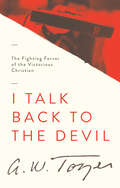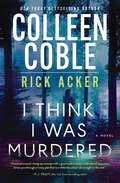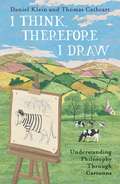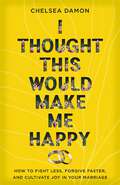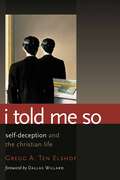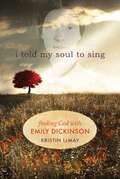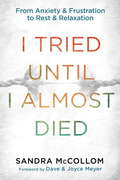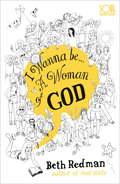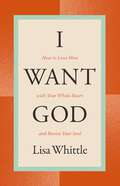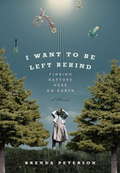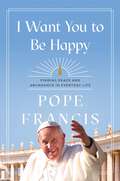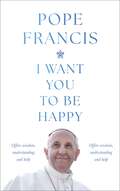- Table View
- List View
I Still Believe: A Memoir
by Jeremy CampWhen Jeremy Camp lost his beloved wife, Melissa, just months after their wedding, the last thing he wanted to do was sing praise to God. But even as he struggled through unimaginable grief and fought to hold on to his faith, God had other plans: Pick up your guitar. I have something for you to write.Jeremy obeyed, pouring out his heart, writing about the hope that God was still there, even in his deepest grief. The song he wrote that day, &“I Still Believe,&” has gone on to inspire millions around the world. This is the story behind that song and the movie that was inspired by it. It&’s an inside look at Jeremy&’s life—from his difficult childhood and teenage years to the tragic passing of Melissa and the spiritual journey that followed, which inspired some of his best-loved songs and led him, eventually, to find love again. I Still Believe is a powerful heart-wrenching book about the strength of undying love and the power of faith.
I Take My Coffee Black: Reflections on Tupac, Musical Theater, Faith, and Being Black in America
by Tyler MerrittAs a 6'2" dreadlocked black man, Tyler Merritt knows what it feels like to be stereotyped as threatening, which can have dangerous consequences. But he also knows that proximity to people who are different from ourselves can be a cure for racism. Tyler Merritt's video "Before You Call the Cops" has been viewed millions of times. He's appeared on Jimmy Kimmel and Sports Illustrated and has been profiled in the New York Times. The viral video's main point—the more you know someone, the more empathy, understanding, and compassion you have for that person—is the springboard for this book. By sharing his highs and exposing his lows, Tyler welcomes us into his world in order to help bridge the divides that seem to grow wider every day.In I Take My Coffee Black, Tyler tells hilarious stories from his own life as a black man in America. He talks about growing up in a multi-cultural community and realizing that he wasn't always welcome, how he quit sports for musical theater (that's where the girls were) to how Jesus barged in uninvited and changed his life forever (it all started with a Triple F.A.T. Goose jacket) to how he ended up at a small Bible college in Santa Cruz because he thought they had a great theater program (they didn't). Throughout his stories, he also seamlessly weaves in lessons about privilege, the legacy of lynching and sharecropping and why you don't cross black mamas. He teaches readers about the history of encoded racism that still undergirds our society today.By turns witty, insightful, touching, and laugh-out-loud funny, I Take My Coffee Black paints a portrait of black manhood in America and enlightens, illuminates, and entertains—ultimately building the kind of empathy that might just be the antidote against the racial injustice in our society.
I Talk Back to the Devil: The Fighting Fervor of the Victorious Christian
by A. W. Tozer"The highest that can be said of any creature is that it fulfilled the purpose for which God made it." — A. W. TozerWhat is holding you back from being all God wants you to be? Are you still holding on to past sins? Do memories of your spiritual failures haunt you? Or maybe you want to stay in control and not become one of those "fanatical" Christians? Tozer says, "It is one of the devil's oldest tricks to discourage the saints by causing them to look back at what they were." Indeed, Satan has been in the business of intimidating and deceiving the people of God for a very long time. Tozer himself felt attacked by the devil even as he prepared the sermons distilled into this book. But as we press toward maturity in Christ, we are armed with great strength to engage in battle with that great Adversary. We can stand up to the Devil and shout "I am a child of God! I will not take this any longer, and I remind you that the forgiveness and cleansing I have freely received comes from Jesus Christ!" You can talk back to the Devil, but will you?
I Talk Back to the Devil: The Fighting Fervor of the Victorious Christian
by A. W. Tozer"The highest that can be said of any creature is that it fulfilled the purpose for which God made it." — A. W. TozerWhat is holding you back from being all God wants you to be? Are you still holding on to past sins? Do memories of your spiritual failures haunt you? Or maybe you want to stay in control and not become one of those "fanatical" Christians? Tozer says, "It is one of the devil's oldest tricks to discourage the saints by causing them to look back at what they were." Indeed, Satan has been in the business of intimidating and deceiving the people of God for a very long time. Tozer himself felt attacked by the devil even as he prepared the sermons distilled into this book. But as we press toward maturity in Christ, we are armed with great strength to engage in battle with that great Adversary. We can stand up to the Devil and shout "I am a child of God! I will not take this any longer, and I remind you that the forgiveness and cleansing I have freely received comes from Jesus Christ!" You can talk back to the Devil, but will you?
I Think God Wants Me To Be A Missionary: Issues to Deal With Long Before You Say, Good-bye!
by Neal PiroloPrompted by the high attrition rate of missionaries who do not first "count the cost" of cross-cultural ministry, Neal Pirolo offers this book to help candidates look closely at scores of issues that should be clarified long before they say, "Good-bye." In an easy-to-read style of dialogue, four young people represent thousands of people who are making the statement: "I Think God Wants Me to be a Missionary!" "I really enjoyed writing this book," Neal happily says, now that it is written. He continues, "It was a real challenge to become twenty-five people, each with their own personality and style of talking and praying. I related most easily with Jason. He's a happy-go-lucky guy about to graduate from high school. But one day, deep in his spirit.... "Then there is Helen, a most proper young lady who has been home schooled since kindergarten. She attends a church that is very active in missions. Her concern is.... Neal continues his reflections: "Kevin, graduating from college, has his own set of challenges, not the least being the embarrassment to him, his three college friends, as well as the whole church. You see, on one Sunday he walked into church with these three men, Nigerians, with skin as black as the good church peoples' Bibles! He realized--too late--that he probably should have given the church advanced notice. But, over the next several months, a lot is going to change.... "Kyle probably had the most difficult issues. Wonderfully, there is a young lady in his church. Just when they realized that their relationship was more than "just friends," they cannot remember. But for some time now there has been an unspoken agreement that wedding bells were in their future. But, one Sunday evening...." Middletown is where we want to discover truth and live in it. We will enter the lives of these four "missionary-hopefuls." In the first four chapters each person in turn goes to his pastor with a specific issue. However, as they face the one, others arise. In Chapters Five through Seven, then, the youth and their pastors and others become involved in the dialogue as these young people deal with scores of issues that should be considered long before they say, "Good-bye."
I Think I Was Murdered
by Colleen Coble Rick Acker"It's a high-octane thriller with the grounding touches of Katrina's Norwegian heritage, the hygge of North Haven, and a very sweet romance between two likable, vulnerable people. Romantic suspense comfort food--just like waffles with cloudberry cream." --KIRKUSThis timely, high-concept novel delves into the impact of AI on a grieving widow who uses a chatbot to "talk" to her dead husband. What she never expects is the response when she asks it to tell her something she doesn't know: I think I was murdered. Reading a novel from bestselling authors Colleen Coble and Rick Acker feels akin to watching a BBC mystery series: by the end of the first scene you can relax, knowing you're in the capable hands of a story that will have a complex puzzle, character-driven plot, and satisfying reveal.Just a year ago, Katrina Berg was at the pinnacle of her career. She was a rising star in the AI chatbot start-up everyone was talking about, married with an adoring husband, and had more money than she knew how to spend. Then her world combusted. Her husband, Jason, was killed in a fiery car crash. Her CEO was indicted, and, as the company's legal counsel, Katrina faces tough questions as the Feds take over and lock her out of her office. The final blow is the passing of her beloved grandmother.Her most prized possession is the beta prototype for a new, ultra-sophisticated chatbot loaded onto her phone. The contents of Jason's email, social media backups, pictures, and every bit of data she could find were loaded into the bot, and Katrina has "talked" to him every day for the past six months. She has been amazed at how well it works. Even the syntax and words the bot uses sound like Jason. Sometimes, she imagines he isn't really dead and is right there beside her. She knows it's slowing her grief recovery, but she can't stop pretending.On a particularly bad day, she taps out: Tell me something I don't know. The cursor blinks for several moments and seems frozen before the reply flashes quickly onto the screen: I think I was murdered.Distraught, Katrina returns to her cozy Norwegian-flavored hometown in the Northern California redwoods and enlists the help of Seb Wallace, local restaurateur and longtime acquaintance, to try to parse out the truth of what really happened. They must navigate the complicated paths of grief, family dynamics, and second chances, as well as the complex questions of how much control technology has. And staying alive long enough to do that is far more difficult than either of them dreamed.Bestselling authors Coble and Acker deftly combine a high-concept plot with gripping intrigue and closed-door romance in I Think I Was Murdered. Don't miss it!"This fast-paced thriller incorporating today's headline news along with compelling family drama proves that the Coble-Acker partnership (What We Hide) will continue to produce hits. Recommend to fans of psychological thrillers such as Lies We Believe by Lisa Harris and Criss Cross by C.C. Warrens." --Library JournalLooking for more from these authors? What We Hide (Tupelo Grove, #1) is also available!
I Think You're Wrong (But I'm Listening): A Guide to Grace-Filled Political Conversations
by Sarah Stewart Holland Beth SilversMore than ever, politics seem to be driven by discord. People sitting together in pews every Sunday feel like strangers and loved ones at the dinner table feel like enemies. Toxic political dialogue, hate-filled rants on social media, and agenda-driven news stories have become the new norm. But it doesn't have to be this way.In I Think You're Wrong (But I'm Listening), two working moms from opposite ends of the political spectrum teach us that politics don't have to divide us. Instead, we can bring the same care and respect to policy discussions that we bring to the rest of our lives.Sarah Stewart Holland and Beth Silvers, co-hosts of Pantsuit Politics, recently named an Apple Podcasts Show of the Year, give you all of the tools you need to:Respect the dignity of every personRecognize that issues are nuanced and can't be reduced to political talking pointsListen in order to understandLead with grace and patienceJoin Sarah from the left and Beth from the right as they teach you that people from opposing political perspectives truly can have calm, grace-filled conversations with one another.Praise for I Think You're Wrong (But I'm Listening):"Sarah and Beth are an absolute gift to our culture right now. Not only do they offer balanced perspectives from each political ideology, but they teach us how to dialogue well, without sacrificing our humanity."--Jen Hatmaker, New York Times bestselling author and speaker"Sarah from the left and Beth from the right serve as our guides through conflict and complexity, delivering us into connection. I wish every person living in the United States would read this compelling book, from the youngest voter to those holding the highest office."--Emily P. Freeman, Wall Street Journal bestselling author of The Next Right Thing
I Think, Therefore I Draw: Understanding Philosophy Through Cartoons
by Thomas Cathcart Daniel KleinWhat makes you think you know what you think you know? What if your right is my wrong? Is it now yet? Like the best comedians, the best cartoonists address philosophy&’s Big Questions. Covering topics as diverse as religion, gender, knowledge, morality and the meaning of life (or the lack thereof), I Think, Therefore I Draw is a joyous introduction to the major debates in philosophy through history and the present. Wittgenstein once said that a serious and good philosophical work could be written that would consist entirely of jokes. Let&’s put that to the test…
I Thirst: The Cross - The Great Triumph of Love
by Stephen Cottrell'A movingly personal book ... the fruit of much deeply meditated sharing of the good news with people of all sorts. Reading it is a real discovery of the fresh waters of faith.' - from the foreword by Rowan Williams 'After this, when Jesus knew that all now was finished, he said, "I am thirsty."' Jesus' words from the cross - a picture of God sharing the world's suffering, experiencing our humanity - can be a window onto God's purposes, leading to a deeper appreciation of his overwhelming love. I Thirst, the Archbishop of Canterbury's Lent book for 2004, helps us explore what the death of Jesus means and how it relates to our lives today.Bishop Stephen Cottrell follows the passion story in John's Gospel, penetrating the deep mystery of a God who loves humanity no matter the cost. Each layer of meaning in the simple cry 'I thirst' is an invitation to consider our own lives and think again about what it means to be a follower of Christ in the modern world.
I Thought It Would Be Better Than This: Rise From Disappointment, Regain Control, and Rebuild a Life You Love
by Jessica N. Turner&“This book will change your life! If you're wrestling with disappointment, heartache, or the curveballs life throws at you, Jessica Turner's story will speak right to your soul.&” - Mel Robbins, bestselling author and host of The Mel Robbins PodcastLearn how to recover from life&’s disappointments and rebuild a life you love. What happens when you look at your life and think, I thought it would be better than this? You know you can&’t stay where you are, but have no idea what to do next. When Jessica N. Turner, a mom of three, lost her 16-year-marriage after her husband came out as gay, her life shattered. With grit and determination, she picked up the pieces, chose hope and courageously rebuilt a beautiful next chapter. During this process, Jessica discovered universal tools that can support you, no matter what you&’re facing. Using thoughtful reflections and exercises, vulnerable storytelling, and practical takeaways, Jessica will help you: ·Evaluate your disappointments, heartaches, and unmet expectations so that you can move forward in healing. ·Talk candidly about your feelings to forge healthier and more meaningful relationships. ·Practice forgiveness and empathy for yourself and others so that you live with more love and less pain. ·Regain control over the parts of life where you have agency instead of passively waiting for things to happen to you. ·Discover creative practices to cultivate daily satisfaction and contentment. · Learn to love yourself and the characteristics that make you unique so that you can be more confident and content.I Thought It Would Be Better Than This is a manifesto of hope that will empower you to transform your circumstances and move forward with intention and purpose.
I Thought This Would Make Me Happy: How to Fight Less, Forgive Faster, and Cultivate Joy in Your Marriage
by Chelsea DamonWhat happened to us?Why is there no joy, no friendship in our marriage?Why don't we feel like a team anymore?If you've ever felt this way about your marriage, you're not alone. Marriage is hard. Every couple comes to a place of disappointment and distance at one point or another. The good news is that your relationship can get better. If you're both willing to work at it, it can work out. Teacher, author, and creator of "Living the Sweet Wife" Chelsea Damon has coached thousands of couples through the hardest seasons of their marriage. In I Thought This Would Make Me Happy, she'll help you take your first steps to a renewed and life-giving marriage. You'll gain the tools you need to:Identify the problems—Anger, bitterness, and resentment arise in all marriages. You'll learn how to assess what the problems are and step away from destructive patterns.Restore harmony—Reflection sections and journal exercises are specially designed to help you and your spouse forgive each other and communicate more deeply.Cultivate the good qualities—Each chapter is designed to help you and your spouse build the characteristics that make a marriage reflect Christ and grow stronger. With stories, practical tips, and biblical truths, I Thought This Would Make Me Happy will show you a way forward. Your relationship with your spouse may be in a difficult season...but it can get better.A marriage full of joy, grace, and unity is possible
I Told Me So: Self-Deception and the Christian Life
by Gregg A. Ten ElshofThink you&’ve ever deceived yourself? Then this book is for you. Think you&’ve never deceived yourself? Then this book is really for you.
I Told My Soul to Sing: Finding God with Emily Dickinson
by Kristin LeMayA surprising patron saint for all who seek or wrestle with GodA journey through faith and doubt with America's greatest poetMany readers think that Emily Dickinson rejected religion and wanted nothing to do with God. And yet her poetry and life tell a deeper story. Looking closely at twenty-five rare and resonant poems, this intimate portrait reveals how Dickinson occasionally believed, thoughtfully doubted, and in her divine wrestling, met God. In chapters on belief, prayer, mortality, immortality, and beauty, Kristin LeMay uncovers the riches of Dickinson's spiritual life and tells of her own search for God between the lines of the poems Dickinson called "hymns." "Through her deep engagement with Dickinson's poems—by turn prayers, partners, revelations, songs—LeMay has written a book that is, in Dickinson's words, 'the Heart's portrait – every Page a Pulse,' every page a kind of faith." –Sarah Sentilles, author of Breaking Up with God: A Love Story "Part spiritual autobiography, part homage to Dickinson's inexhaustible poetic genius, and part exuberant close readings of the astonishing poems in which she wrestles with questions of faith and belief, I Told My Soul to Sing is a valuable study of the poet's heterodox imagination. LeMay does not shackle Dickinson to a procrustean bed of doctrine and piety, dilute the poet's astringent ironies, or flatten the provocative ambiguities. She has a gift for choosing unfamiliar poems from the canon and for judiciously quoting and interpreting them. A smart, seriously playful, winning, and readable commentary on a quintessentially elusive, thorny, and linguistically daring American poet." –Herbert Leibowitz, editor, Parnassus: Poetry in Review
I Tried Until I Almost Died: From Anxiety and Frustration to Rest and Relaxation
by Sandra McCollomTired of trying to measure up? Trade your anxiety and frustration for rest and relaxation.Many of us believe that in order to please God, we have to be perfect. It&’s an easy lie to buy into. In a culture that emphasizes accomplishment and ever-higher goals, we feel driven to do more, achieve more, be more. And we get caught up in the unforgiving treadmill of self-imposed rules, believing that we should, we need to, we must. The result? Anger, frustration, and anxiety that keep us far away from the life of peace that Jesus promised. For years, Sandra McCollom lived in this trap. Finally worn out from striving for perfection but constantly feeling like a failure, one day she prayed in desperation, begging God for help. God answered Sandra by setting her on a life-changing journey to discover the riches of His grace. In I Tried Until I Almost Died, Sandra shares how she left behind her burden of anxiety and fear and shows you how to experience for yourself the freedom of trusting solely in the perfecting power of God&’s grace.
I Wanna Be Well: How a Punk Found Peace and You Can Too
by Rod Meade Sperry Miguel ChenA punk rocker’s guide to grow, learn, and appreciate the present moment—in short, to live a life that doesn’t totally suck.All Miguel Chen ever wanted was to be happy. Just like everyone else. But—also like everyone else—he’s suffered. A lot. Running from difficult personal losses—like the deaths of loved ones—was something he did for years, and it got the best of him. Eventually, though, he stopped running and started walking a spiritual path. That might be surprising for a dude in a relentlessly touring punk band (Teenage Bottlerocket), but Miguel quickly found that meditation, mindfulness, and yoga really helped. They allowed him to turn inward, to connect to himself and the world around him. Suddenly, he had found actual happiness. Miguel’s realistic. He knows it'll never be all sunshine and peaches. And yet, he is (for the most part) at peace with the world and with himself. It shocks even him sometimes. But he’s come to see the interconnectedness of all things, the beauty of life…even the parts that suck. Each short chapter ends with a hands-on practice that the reader can put into action right away—and each practice offers a distilled “TL;DR” takeaway point. TL;DR: Miguel Chen shares stories, meditations, and practices that can help us reconnect to each other, ourselves, and the world. They’ve worked for him—they can work for anyone.
I Wanna Be... A Woman of God!
by Beth RedmanBeth Redman, bestselling author of Soul Sista, has written a unique, much-needed new book to affirm and encourage young women in their relationship with God and with others.The author sets out to fight the 'women's disease' of today's society: paranoia, inferiority and insecurity. From a strong scriptural basis, she draws out the need to learn to be secure, without comparing ourselves to others: to 'run the race marked out for you' in your own lane, forgetting where everyone else is.Returning to God's original design for women and his love for them, Beth asserts that Eve was not an afterthought, and that the biblical role of 'helper' has long been abused. A true helper is strong, protective and wise, and these are qualities to be embraced by young women, whether single or married. Resolute and practical, this book addresses the issues they face in working out their faith:·being vigilant against 'infection' - that is, gossip or comparisons, and the freedom that comes with this security in themselves;·how to approach the exercising of gifts in the church without 'feminist aggression';·how to heal self esteem, body image, and relationships;·forgiveness;·believing and speaking the best - clinging to God's truth;·being all that God designed them to be.A powerful, empowering guidebook for women in their late teens and twenties, it's the spiritual equivalent of a day at a health farm, but with deeper, longer-lasting benefits!
I Want God: How to Love Him with Your Whole Heart and Revive Your Soul
by Lisa WhittleI Want God, now revised and updated, will help you focus on your true pursuit of God and watch Him move your soul. Lisa Whittle amplifies the solution to the heart cry of the "sick of me" life.It is in the heart of every person to want God, but life gets loud, and we forget Him. We get consumed by our problems, our desires, ourselves. We forget our first encounter with the Savior and how much we once wanted Him. But Lisa Whittle believes that if we calibrate our attention, refocusing on God determines the perspective for everything in our life:what we fight for,what we tolerate,how we make decisions,what we choose,what we love,what we chase,what we let go of, andwhat we are willing to change. A guidebook, a teacher, and a resource, all in one, I Want God brings rich simplicity to life-altering principles, perfect for your personal Lenten reflection. With her signature boldness and raw authenticity, author and podcast host of The Jesus Over Everything podcast, Lisa Whittle inspires with bottom line truth when we want Him and experience a soul revival, there is no limit to what we will do for Him.
I Want It All
by Gwen SmithGod created you for exceptional impact. Exceptional power. And exceptional blessings.Gwen Smith knows how easy it is to dismiss God's plans with the thoughts, I can't make a big difference for God because I'm just an ordinary woman with an ordinary life. Yet God created us to join Him in doing amazing work in the world. He created us to live with abundant joy, courage, and influence. But not the joy, courage, and influence of the world. He offers His grace for each failure, His love that shatters hate, His peace that soothes the turmoil, His comfort, guidance, wisdom, rest, power, and significance. Every blessing He has for us is ours for the taking.I Want It All will ignite a fire in your heart to experience more faith, more power, and more impact. More of Jesus. All of Jesus. Everything that God has for you.
I Want My Life Back!: Life Management for Busy Women
by Lorraine Bosse-SmithWe live in a fast-food society and seem to live on the trend mill at warp speed. This book offers help, guidance, and encouragement to the woman on life's journey who wishes her life had more quality. And to be honest, she feels like someone has taken her life, and she wants it back!“Lorraine Bossé-Smith provides counsel, examples, and plans to help the reader find a quality of life that is enriching and rewarding. Her book is chock-full of personal testimony and positive ways of meeting and overcoming stress.” -Johnnie C. Godwin, author of Syzygy: Living a Powerfully Aligned Life “How very impressive! Bossé-Smith gives us workable, simple, and inspiring ways to take control of our lives. All of my Regional VPs will have this as required reading.” -Amy S. Harrison, CEO, Innovative Solutions for Youth, Inc.Lorraine Bossé-Smith is a consultant, coach, trainer, and writer. She is the President of Concept One located in Murrieta, California, but serves clients across the country. She helps people to enhance their communication, create stronger relationships, increase productivity, and improve the quality of their life.Lorraine is in the 2005 Who’s Who of Female Executives and the 2000 Who’s Who of Entrepreneurs. In addition, Lorraine is an AFAA Certified Fitness Instructor able to teach: Precision Cycle, Sports Conditioning, Kickboxing, aerobics, Forever Fit (seniors) and Pilates Mat. She is an active individual who loves to play tennis, hike, bike, and enjoy life to its fullest!
I Want My Mummy (Bloodhounds, Inc. #8)
by Bill MyersMadcap MYSTERIES With a MESSAGE! Who is the secretive new stranger living in the small town of Midvale? Why are dozens of garage doors suddenly banging open and shut? Can Bloodhounds, Inc. Detective agency stop an angry mob . . . before it's too late? After the priceless mummy of King Tut Tut 33rd disappears from Midvale Museum, Sean and Melissa Hunter, owners of Bloodhounds, Inc., start digging up clues. But when a late-night graveyard chase brings them face-to-face--or face-to-bandages, that is--with the supposed living dead, the kid sleuths need far-out faith to remember that people aren't always what they seem . . . .
I Want To Be Left Behind: Finding Rapture Here on Earth
by Brenda PetersonGrowing up between Baptist Endtimers and apocalyptic Greensua rollicking tale of survival
I Want You to Be Happy: Finding Peace and Abundance in Everyday Life
by Pope FrancisFrom Pope Francis, a daily reader that explains the characteristics of true, lasting happiness—achievable no matter your circumstances or situation. Pope Francis shares wisdom and encouragement to help readers seek God's will and His best. The short, accessible chapters distill His message into bite-sized readings that can be read all at once or in daily segments. This collection of inspiring pieces reminds readers that God cares and wants us to live well and love well. God wants us to be happy.
I Want You to be Happy
by Pope FrancisPope Francis' manifesto for the happiness of every man and woman.God planted happiness in the souls of each of us. God wants us to be happy. But so many of us have misunderstood what this means, and we search for fulfilment in the wrong places. In I Want You To Be Happy, Pope Francis explains the characteristics of true, lasting happiness, no matter your circumstances or situation. In this new book, which quickly became his biggest bestseller in many years in Italy when it was published in 2022, Pope Francis shares wisdom and encouragement to help readers seek God's will and His best. The short, accessible chapters allow distill the message into bite-sized readings, and can be read all at once or in daily segments. This collection of inspiring pieces will encourage, inspire, and remind all readers that God cares and wants to live and love well.
I Want You to be Happy
by Pope FrancisPope Francis' manifesto for the happiness of every man and woman.God planted happiness in the souls of each of us. God wants us to be happy. But so many of us have misunderstood what this means, and we search for fulfilment in the wrong places. In I Want You To Be Happy, Pope Francis explains the characteristics of true, lasting happiness, no matter your circumstances or situation. In this new book, which quickly became his biggest bestseller in many years in Italy when it was published in 2022, Pope Francis shares wisdom and encouragement to help readers seek God's will and His best. The short, accessible chapters allow distill the message into bite-sized readings, and can be read all at once or in daily segments. This collection of inspiring pieces will encourage, inspire, and remind all readers that God cares and wants to live and love well.
I Want a Baby, He Doesn't: How Both Partners Can Make the Right Decision at the Right Time
by Donna J. Wade Liberty KovacsWhat does a couple do when one partner wants a child and the other partner does not? This is a guide for couples who face that challenge.


